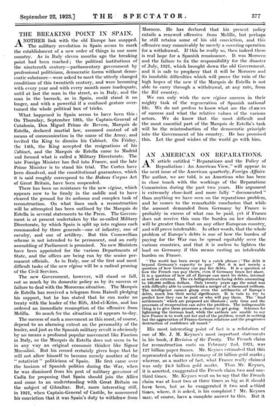THE BREAKING POINT IN . SPAIN.
A NOTHER link with the old Europe has snapped. The military revolution in Spain seems to mark the establishment of a new order _of things in one more country. As in Italy eleven months ago the breaking point had been reached ; the political institutions of the nineteenth century—parliamentary government by professional politicians, democratic forms without demo- cratic substance—were asked to meet the utterly changed conditions of this twentieth century, and were becoming with every year and with every month more inadequate, until at last the man in the street, as in Italy, and the man in the barrack, as in .Spain, could stand it no longer, and with a powerful if a confused gesture over- turned the whole political box of tricks.
What happened in Spain seems to have been this : On Thursday, September 18th, the Captain-General of Catalonia, Don Miguel Primo de Revera, Marquis de Estella, declared martial law, assumed control of all means of communication in the name of the Army, and invited the King to dismiss his Cabinet. On Friday, the 14th, the King accepted the resignations of his Cabinet, and the Marquis de Estella came to Madrid and formed what is called a Military Directorate. The late Foreign Minister has fled into France, and the late Prime Minister is to stand his trial. The Cortes have been dissolved, and the constitutional guarantees, which is said roughly correspond to the Habeas Corpus Act of Great Britain, have been suspended.
There has been no resistance to the new regime, which appears now to be firmly in the saddle and to have cleared the ground for its arduous and complex task of reconstruction. On what lines such a reconstruction will be attempted has been outlined by the Marquis de Estella in several statements to the Press. The Govern- ment is at present undertaken by the so-called Military Directorate, by which Spain is split up into regions each commanded by three generals—one of infantry, one of cavalry, and one of artillery. But this Cromwellian scheme is not intended to be permanent, and an early assembling of Parliament is promised. No new Ministers have been appointed for the various Departments of State, and the offices are being run by the senior per- manent officials. As in Italy, one of the first and most difficult tasks of the new regime will be a radical pruning of the Civil Services.
The new Government, however, will stand or fall, not so much by its domestic policy as by its success or failure to deal with the Moroccan situation. The Marquis de Estella has received a telegram from Raisuli pledging his support, but he has stated that he can make no treaty with the leader of the Rifs, Abd-el-Krim, and has ordered an immediate resumption of the offensive from Melilla. So much for the situation as it appears to-day.
The success of such a movement as this must, of course, depend to an alarming extent on the personality of the leader, and just as the Spanish military revolt is obviously by no means a profound popular movement like Fascism in Italy, so the Marquis de Estella does not seem to be in any way an original economic thinker like Signor Mussolini. But his record certainly gives hope that he will not allow himself to become merely another of the " rotativist " politicians of Spain. He first came over the horizon of Spanish politics during the War, when he was dismissed from his post of military governor of Cadiz for proposing that Spain should join the Allies and come to an understanding with Great Britain on the subject of Gibraltar. But, more interesting still, in 1921; when Captain-General of Castile, he announced his conviction that it was Spain's duty to withdraw from Morocco. He has declared that his present policy entails a renewed offensive from Melilla, but perhaps he still retains some of his old conviction, and this offensive may conceivably be merely a covering operation for a withdrawal. If this be really so, then indeed there is real hope for a Spanish renaissance. It was Morocco and the failure to fix the responsibility for the disaster of July, 1921, which brought down the old Government, and it is safe to prophesy that it will be Morocco and its insoluble difficulties which will prove the ruin of the high hopes of the new if the Marquis de Estella is not able to carry through a withdrawal, at any rate, from the Rif country.
We can only wish the new regime success in their mighty task of the regeneration of Spanish national life. We do not profess to know what arc the el an of success and what the relative values of the various actors. We do know that the most difficult and the most essential part of the Marquis de Estella's task will be the reintroduction of the democratic principle into the Government of his country. He has promised this. Let the good wishes of the world go with him.






































 Previous page
Previous page